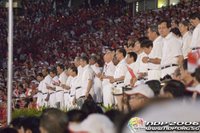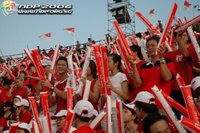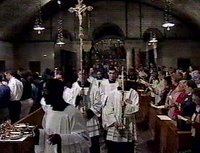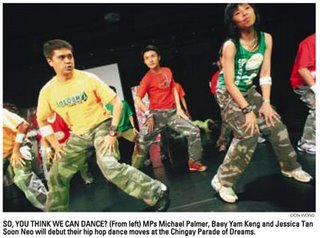"... mom’s friend sent her some blog post by some ..."
Wading through all the posts and forum comments (and these ran into the hundreds), I found it interesting that only one comment made explicit reference to the opening clause of the post: "... mom’s friend sent her some blog post by some ..." It would be best if I could go back and actually quote what this forum comment said but that would necessitate wading through all those forums again. But I remember it pretty well. The comment was a strange, unsupported over-reading. It suggested that because the post begins with these words, that the entire Wee family and the friends of the Wee family share the same elitist sentiments as Wee Shu Min. Such a reading is patently unsupportable by this line alone, irrelevant and probably the result of trying to push a point of view that overdetermines the act of interpretation.
Yet what does "... mom’s friend sent her some blog post by some ..." tell us? Can we read it or misread it intelligently, elegantly, productively and creatively, or at least play with the phrase in an entertaining fashion? In reading this moment, I wish to invoke the Derridean notion (indulge me) of "the Supplement". Given how much the commentary has centered on what Wee Shu Min's post was about and how it was expressed, it seems strange to me that the opening received very little attention. Her words are quoted, repeated and parodied but her opening remains largely intact, glossed over, merely a prelude to the "heart" of the matter. Unlike the resounding finish ("please, get out of my uncaring elite face") that got played over and over, adopted, ventriloquized and bastardized, almost nobody had anything to say about this opening. But I hope that I'm not merely being perverse in trying to read an unreadable moment (is there ever an unreadable?) Read as Supplement, I think that the opening elaborates more fully some of the anxieties that proliferate in the commentary about her post.
The Supplement
The Derridean notion of the Supplement can actually be explained quite simply (unlike much of Derrida's thought). As its name suggests, the Supplement is an add-on, a secondary to the natural or actual, an extension to the main thing. Think about an appendix, annex or addendum of a book. There's material there that is meant to extend understanding, provide more detail or fill-in the gaps. So this is one face of the Supplement, and indeed, it seems to be the dominant face that shows up most of the time. The Supplement is there to help us appreciate the "real thing" better. But Derrida suggests that there is also another face to the Supplement:
But the supplement supplements. It adds only to replace. It intervenes or insinuates itself in-the-place-of; if it fills, it does so as if one fills a void. If it represents and makes an image, it is by the anterior default of a presence. Compensatory and vicarious, the supplement is an adjunct, a subaltern instance which takes the place. As substitute, it is not simply added to the positivity of a presence, it produces no relief, its place is assigned in the structure by the mark of an emptiness. (On Grammatology 145)
A good place to look for a lucid explanation (and examples) of the concept is here.
By reading this opening line as Supplement (made supplement in the discourse about the post because it got ignored and appears marginal), I hope to show how the supplementary status of a phrase or line can transform and enrich interpretative possibilities.
The first face of the Supplement: add-on / extension
The line "... mom’s friend sent her some blog post by some ..." gives us a better sense of the blog post's point of origin. It is significant to me that the meager context that it gives tells us something about reception and production. When I write a blog post, when most of us do, we don't regularly give a self-conscious rationale for why we're writing a post. The assumption is that we write a post because something we've read, experienced or thought about was interesting, significant or painful enough to stimulate a response. We assume a primary encounter with the phenomenon we're thinking about. Yet here we have a self-conscious reflection on how the post that follows originated. It isn't that Wee Shu Min encountered Derek Wee's post because she was blog-surfing and felt compelled to write back. Nor did her friends tip her off about Derek Wee's post (as is true for this post, thanks Ziliang ...) Something different happened: her mother got her to read Derek Wee's post. Further complicating (and enriching) the moment is the further nugget of information: knowledge of Derek Wee's post was a tip off from her mother's friend. What is intriguing here are the chains of transmission: friend-to-friend, then mother-to-daughter.
The "friend-to-friend" link
"... mom’s friend sent her ...", in the first face of the Supplement seduces us to speculate about why Derek Wee's post got circulated to Mrs. Wee in the first place. I introduce "Mrs. Wee" (though she may go by some other name) because she appears to be THE central figure in the production of Wee Shu Min's post that has been left out in almost all discussion about the post. Indeed, if "Mrs. Wee" did not have a friend who led her to read Derek Wee's article, we might not have Wee Shu Min's vitriol. Indeed, if "Mrs Wee" didn't read Derek Wee's article, and think it of a certain significance, and interesting enough to direct Wee Shu Min's attention to it, we also, may not have had the subsequent productions. But what happens to "Mrs. Wee" in the resulting discourse? She is obscured. Instead, the Daughter takes prime position and after her, the Father. Is this reflective of our prejudices in reading, that we are drawn to interpret the discursive moves of the noisy and the powerful?
Another reason why "... mom’s friend sent her ..." becomes useful in our reading of the post, lies in the way it sets a context that we can never actually be sure about. It allows us, or rather, forces us, to speculate why a friend would send Derek Wee's post. Any number of reasons might be possible, and each would shift the subsequent discourse in a different direction. For those of us inclined to read tragically, we could imagine that the post was first sent to "Mrs. Wee" so that fellow member of the well-heeled elite could laugh at the bad writing and futile struggles to secure a reasonable livelihood of the middle-class. In a more ironic vein, perhaps Derek Wee's original post was sent to "Mrs. Wee" (and thus to her husband, the MP and here, we can further speculate about other transmissions) to alert them about how the "ordinary" Singaporean perceives his prospects and career options. I can't imagine a suggestion that would lend to a comic reading, but I'm open to suggestions! The point is, read for some kind of "context", it allows us to wonder about how and why these posts are circulated in the first place.
The "mother-to-daughter" link
We have nothing more from the line that tells us WHY (again) a mother might have asked her daughter to look at Derek Wee's post. We might imagine reasons similar to why a friend would point "Mrs. Wee" to the post but also throw in a little maternal instinct into the mix. But we can think about why Wee Shu Min preserves and records this chain of transmission as a beginning. Why does the writer not begin with "I read a post by some ..." Why the preservation of origins, as if first hand knowledge or contact with such a post cannot be admitted? Perhaps the writer wants to insist on the distance, on the fact that she is not one who would regularly respond or think about such a post, except that it were put to her, except that she were MADE to read it by a person of some authority. Perhaps her subsequent discursive production is an act of retaliation, instead of a response.
The second face of the Supplement: Usurpation
Thus far, I've read "... mom’s friend sent her some blog post by some ..." as an extension to the rest of the post. I've read it as setting a kind of context and as establishing certain interpretive possibilities that might inform our reception of the rest of the post (and of the rest of the discourse that was produced in reaction to the post). I now turn to the second face of the Supplement, where "... mom’s friend sent her some blog post by some ..." can be read as supplanting and overtaking the rest of the post, and indeed, even contain the anxieties about elitism and privilege that mark the responses to Wee Shu Min's post.
This possibility of interpretation turns on the simple observation that not many parents I know actively direct their eighteen-year-old daughters to pieces of news or articles that are they think are interesting. I've done it for years as a teacher, and I do it because it's my job (and because I'm interested in these things). But even then, not many students take up my suggestions (unless coercion is applied and even then, I get a low rate of success). But I think it's rare for parents to do this and I think I'm right about this generalization. The act (rather active and deliberate, I must say) of drawing your child's attention to material that he or she should read (whatever the intent) demonstrates a "child-parent" bond that is itself predicated on a certain level of education and social class. I know I'm going out on a limb a little here. I obviously do not mean to suggest that only rich and well-educated parents are actively involved in what their children read or think about but I think it is generally true that it is the privileged who have enough energy, time and confidence to direct their child's interests. In one sense, "... mom’s friend sent her some blog post by some ..." usurps the rest of Wee Shu Min's post. If an individual only reflects the prejudices and beliefs of his or her social class, we have everything sealed up in that first line, which is a densely packed expression of social and cultural capital. Indeed, the responses to the post, the diatribes about elitism, privilege and abuse of power, can be traced back to this single line, this "parent-child" moment of transmission that few share. Indeed, even the father's initial defence of the child, is found in this opening line. Thus read as a "dangerous supplement" that threatens to overthrow the piece, the line can be said to determine, even predetermine, the rest of the discourse, and even influence and overtake everything else we might say about the matter.
Of course, just having copious social and cultural capital does not doom anyone to espouse the views that Wee Shu Min has. But reading "... mom’s friend sent her some blog post by some ..." as the Supplement alerts us to fact that the social and cultural assumptions that ground discourse, that are often glossed over and left uninterrogated even when they are on the page, may give us an insight into the origins of elite discourse and power. Perhaps we gloss over these moments because we are afraid to admit that beneath the veneer of close familial bonds, behind the curtains of the mundane, we are still subject to the dangerous workings of privilege and power.







